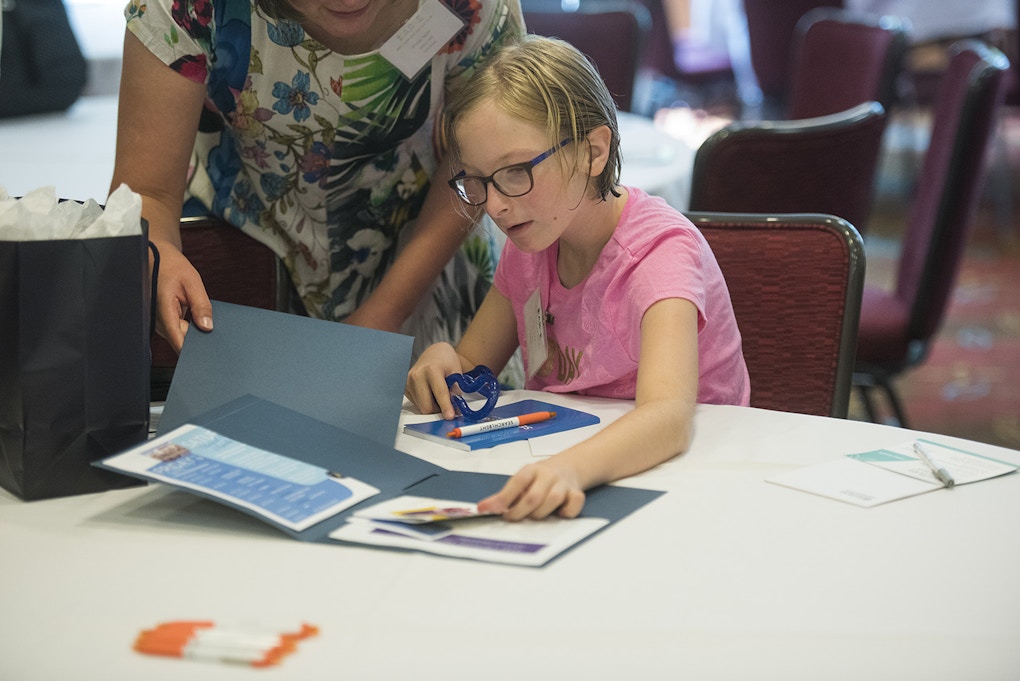
The Simons Foundation Autism Research Initiative (SFARI) is pleased to announce that Simons Searchlight will hold the CSNK2A1, HIVEP2, MED13L and SETBP1 Family and Scientific Conference in Baltimore, MD from August 4–7, 2022. Basic and clinical researchers, carriers of these genetic changes and their families are invited to participate.
Launched in 2010, the Simons Searchlight research registry/database and biorepository is a SFARI-supported program that promotes research into the genetics of autism spectrum disorder (ASD) and other rare genetic neurodevelopmental conditions. Currently, 152 genes and 23 copy number variants are eligible for Simons Searchlight, including CSNK2A1, HIVEP2, MED13L and SETBP1.
Mutations in these four genes have been linked to a number of neurodevelopmental challenges, including delays in the development of motor skills, speech and cognition, reduced impulse control, hypotonia, atypical facial features and congenital heart defects1-11.
To date, Simons Searchlight has enrolled 79 carriers of CSNK2A1, 41 carriers of HIVEP2, 73 carriers of MED13L and 65 carriers of SETBP1. Approximately 80 Simons Searchlight families across these four conditions are expected to attend the conference in person.
The first day of the conference (August 4) will consist of four separate scientific sessions, each on one of the genetic conditions. Interested researchers who are not able to attend in person will be able to join remotely. From August 5-7, families will participate in research projects in the morning and talks in the afternoon. Research projects have not been finalized and opportunities to conduct research studies with participants and families will be available throughout the event; phlebotomists will be present on-site to help collect blood samples from participants. If you are interested, please contact the Simons Searchlight team at coordinator@simonssearchlight.org.
To support research opportunities on these rare conditions, SFARI is offering funding for up to five $10,000 awards to perform research studies at the conference, including conducting in-person assessments and testing. Researchers interested in applying for funding should submit an application through this form by February 1, 2022. The application should detail the project’s hypothesis, design and anticipated outcomes, as well as space and equipment requirements and the time needed to complete the work.
Simons Searchlight will also reimburse researchers up to $400 per person for a researcher and a member of their lab for the costs of travel. Hotels and any necessary accommodations for research will be provided. For families, daycare and translation services for requested languages will be offered.
The meeting will provide a forum for researchers to discuss new advances in CSNK2A1, HIVEP2, MED13L and SETBP1-related syndromes, as well as unique opportunities to conduct in-person research with many participants in only a few days. In-person research in these conditions is challenging because of their rarity and the many difficulties that may prevent affected families from traveling to individual labs—challenges that the COVID-19 pandemic has only exacerbated. By bringing researchers and families together, the Simons Searchlight Family and Scientific Conference aims to facilitate access to a large amount of clinical and biomedical data that could lay the groundwork for future research, while providing the family community with opportunities to participate in research that can lead to a better understanding of the mechanisms underlying their conditions and potential treatments and supportive options. When researchers and families are placed together, researchers are able to learn as much from families as families learn from researchers.
“We hope this meeting will help advance research and forge new connections between researchers and families affected by these rare conditions. The Simons Searchlight community is stronger when we can all work together,” says Wendy Chung, director of clinical research at SFARI and the Kennedy Family Professor of Pediatrics in Medicine at Columbia University. “We are grateful to our dedicated family community and look forward to seeing them again next August.”
References
- Okur V. et al. Hum. Genet. 135, 699-705 (2016) PubMed
- Chiu A.T.G. et al. Clin. Genet. 93, 880-890 (2018) PubMed
- Owen C.I. et al. Am. J. Med. Genet. A. 176, 1108-1114 (2018) PubMed
- Steinfeld H. et al. Neurogenetics 17, 159-164 (2016) PubMed
- Asadohalli R. et al. Eur. J. Med. Genet. 21, 1100-1104 (2013) PubMed
- Cafiero C. et al. Eur. J. Med. Genet. 23, 1499-1504 (2015) PubMed
- van Haelst M.M. et al. Eur. J. Med. Genet. 23, 135-138 (2015) PubMed
- Asadollahi R. et al. J. Med. Genet. 60, 451-464 (2017) PubMed
- Filges I. et al. J. Med. Genet. 48, 117-122 (2011) PubMed
- Marseglia G. et al. Eur. J. Med. Genet. 55, 216-2212 (2012) PubMed
- Coe B.P. et al. Nat. Genet. 46, 1063-1071 (2014) PubMed


